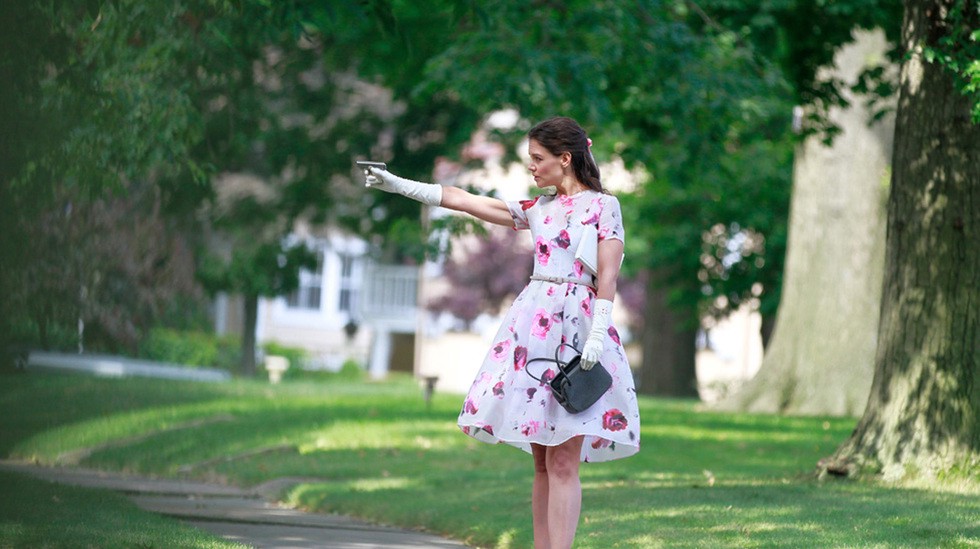Born in Sandusky, Ohio, and raised by an Italian factory-worker
mother whose dream of being an artist were squelched by a teacher who told her
she had not imagination, Karen Leigh Hopkins was not going to let anyone tell her no. She
left Ohio with dreams of becoming an actress. After being cut out of three
major features, she had 21 bucks left and was driving a lawn mower doubling as a
car, teaching anyone she could.
Leonard Cohen says “writing is a desperate activity,” and so it was that desperation that fueled
her first screenplay — which she sold — and called her mother at the factory
with the news. “You can quit your job now,” Hopkins said, to which her mother replied. “That
doesn’t happen to people like us.”
Hopkins’ writing credits include Because I Said So and Stepmom.
She received an Emmy nomination for Showtime’s What Girls Learn and won the Humanitas Award for ABC Family’s Searching For David’s Heart. She has
also sold and produced features and pilots for Universal, Sony, Showtime, Fox,
and Paramount, as well as a branded series for the web with Sony/Crackle.
Miss Meadows is Hopkins’ first written-and-directed feature film. (Press materials)
The film will debut at the Tribeca Film Festival on April 21.
Please give us your description of
the film playing.
Miss Meadows has manners but is no snob. She is a substitute elementary school teacher who holds everyone accountable by
the same, excruciatingly eloquent standards she demands of herself. With the impeccable
clarity of a child who witnessed an impossible tragedy, she is no victim — but
no hero, either. Rather, she is a citizen of the world who’s taken it upon
herself to go from town to town cleaning up criminals that law enforcement can’t
enforce with the sole purpose to protect children. When love and fate rock her
heretofore ordered world, she makes the appropriate adjustments to her life and
love, never forgetting who she truly is, and, ultimately, finding a way of
juggling home and work.
What drew you to this story?
I wrote this film as I contemplated
having a child of my own, and bringing it into this often beautiful, sometimes brutal and cruel world. What would I teach my unborn child? How would I explain fear and
courage — and kindness? At about the same time, an innocent little girl of 12
years old was abducted out of her bedroom slumber party and eventually killed.
After a nationwide manhunt, he was found, and a news report suggested we be “compassionate” toward him as he was the victim of abuse in the past.
I’d always thought of
myself as a liberal person but I wondered if we’d completely lost our marbles. Who,
I wondered in my rage, could protect children and not worry about the politically correct grey area? Who knew right from wrong, black from white, and would give everyone a second chance but nobody a third, while never
compromising manners and grace? That day, Miss Meadows appeared to me like an
apparition — and then, a necessary philosophy. She’s been with me ever since.
What was the biggest challenge?
Getting it made after 14 years and
keeping it original. And being a good mother to my little girl during all
facets of getting it done.
What advice do you have for other
female directors?
Stay female. It becomes you. It’s
your strong suit. Let the work guide you, not your gender. Nobody cares if you’re
a woman or a man — or a unicorn — only that the work is good.
What’s the biggest misconception about
you and your work?
That people think they know what I
am and what I am not capable of.
Do you have any thoughts on what are
the biggest challenges and/or opportunities for the future with the changing
distribution mechanisms for films?
Frankly, every day has enough
challenges in it; I try not to anticipate more. I prefer to trust in the power
of a compelling story with the heart and soul no mechanism is capable of
having.
Name your favorite women directed
film and why.
It’s a tie (no pun intended) between Patricia
Rozema’s I’ve Heard the Mermaids Singing and Julie Taymor’s The Tempest.
There’s bold choices and surprises every
step of the way. Taymor’s fearless in how she stirs the creative pot, going dark
and light, and cinematically her images are so evocative that they entered my
central nervous system. Rozema is a poet. The moment Shelia MaCarthy reached
for the can of peas still makes me cry and understand the why of why.







